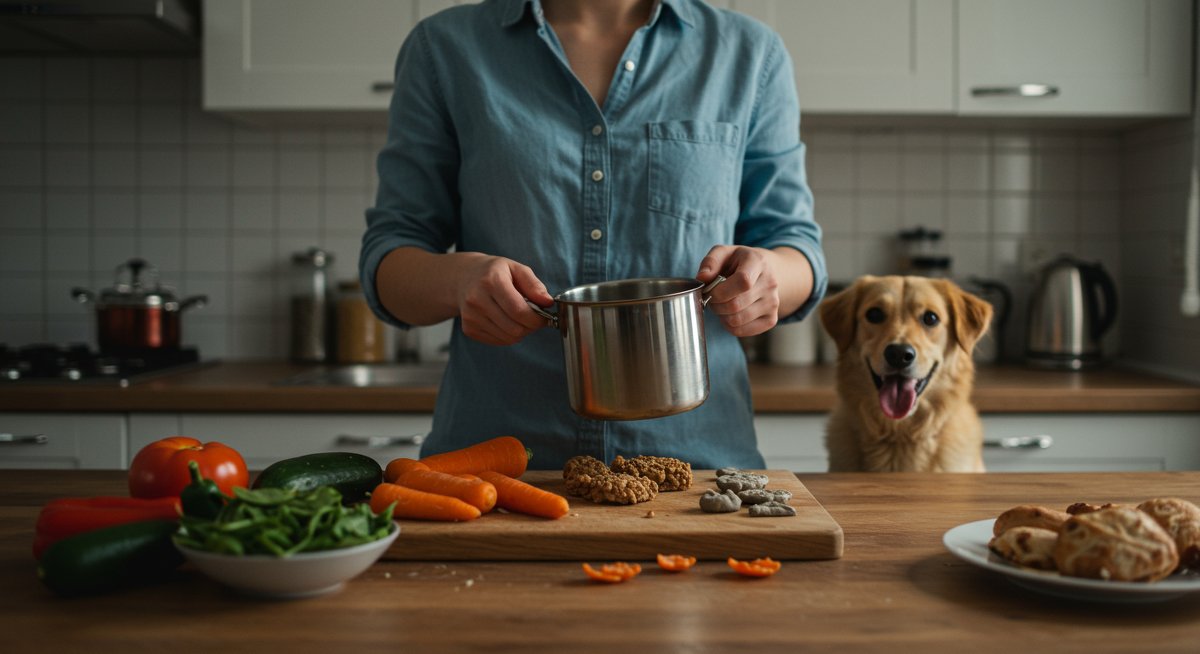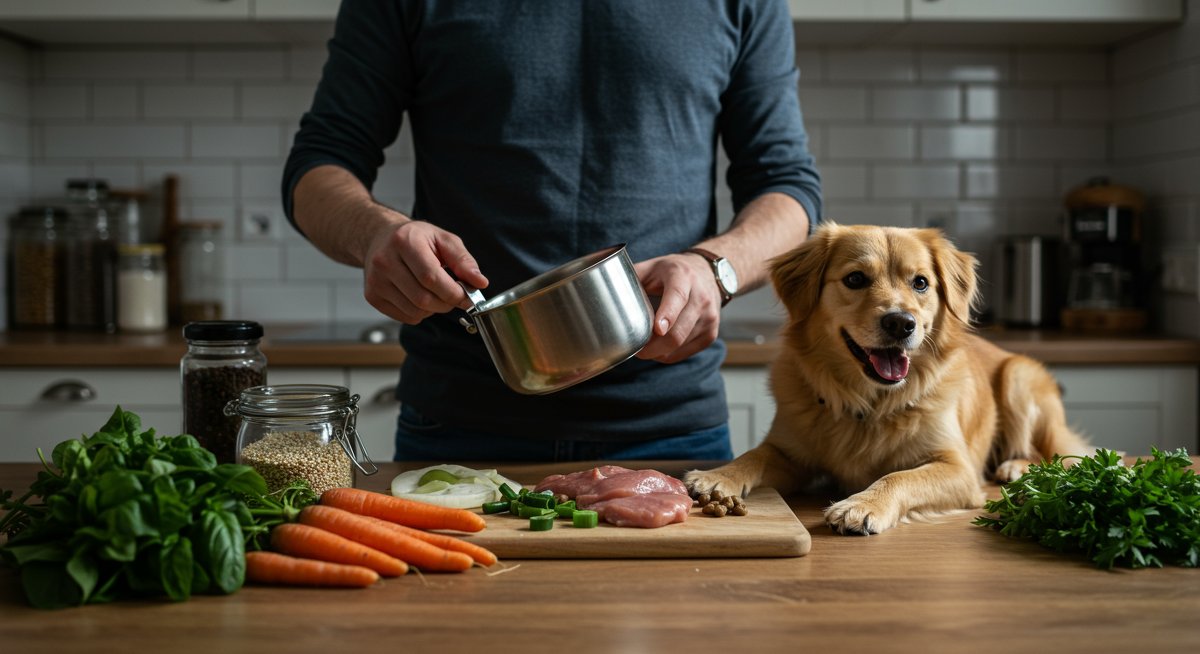Does your dog suffer from the discomfort of allergies? As a dog owner, you're likely familiar with the incessant itching, skin irritation, and digestive issues that can plague our canine companions. While commercial dog food brands offer various options, many owners are turning to homemade diets to better control ingredients and tailor meals to their dog's specific needs. This guide will walk you through the process of creating a healthy, homemade diet designed to alleviate your dog's allergy symptoms and improve their overall well-being. We will cover everything from understanding common allergens to creating delicious, allergy-friendly recipes.

Understanding Dog Allergies: The Root of the Problem
Before diving into homemade diets, it's crucial to understand what causes allergies in dogs. Allergies are the immune system's overreaction to typically harmless substances, called allergens. These allergens can be environmental (pollen, dust mites, molds) or food-related. Food allergies often manifest as skin problems (itching, redness, rashes) or digestive issues (vomiting, diarrhea). The most common food allergens for dogs include beef, dairy, wheat, chicken, egg, and soy. However, allergies can also stem from less common ingredients. The only way to truly know what your dog is allergic to is through a process of elimination, often under the guidance of a veterinarian.
Example 1: A Labrador Retriever named Max suffered from constant itching and skin lesions. After a vet-supervised elimination diet, it was determined that Max was allergic to chicken, a common ingredient in many commercial dog foods. His owner switched to a homemade diet featuring lamb and sweet potatoes, and Max's symptoms dramatically improved within weeks. This highlights the power of identifying and eliminating problematic ingredients.
Example 2: Consider a small breed like a Miniature Schnauzer with sensitive digestion. The owner suspects food allergies due to frequent loose stools and gas. After eliminating common allergens and introducing novel proteins like duck and limited carbohydrate sources, the dog's digestive issues resolved. This example shows how specific breeds might be more prone to sensitivities, and diet adjustments can make a substantial difference.
Common Mistakes: One common mistake is not being patient during an elimination diet. It takes time (typically 8-12 weeks) to see the full effects. Another is not strictly adhering to the diet, including all treats and snacks. Hidden ingredients in commercial treats can sabotage the process.
Expert Tip: Keep a detailed food diary, logging everything your dog eats, plus any symptoms. This will help you connect the dots between ingredients and reactions.
Crafting a Homemade Diet: Step-by-Step Guide
Creating a homemade diet requires careful planning, research, and attention to detail. Here's a step-by-step approach:
- Consult with Your Veterinarian: Before making any dietary changes, it’s essential to consult with your veterinarian. They can help rule out other medical conditions and guide you through the elimination process. They may also suggest a veterinary nutritionist to formulate a balanced diet.
- Identify Potential Allergens: If your vet suspects a food allergy, they may recommend an elimination diet. This involves feeding your dog a diet of novel protein and carbohydrate sources that they have not previously eaten. This may include venison, kangaroo, or duck. This period allows you to identify trigger ingredients.
- Select Allergy-Friendly Ingredients: Once you know which ingredients to avoid, you can start choosing safe alternatives.
- Protein Sources: Lamb, turkey, duck, venison, and fish are often well-tolerated.
- Carbohydrates: Sweet potatoes, pumpkin, rice, oats, and quinoa can provide necessary energy.
- Vegetables: Green beans, carrots, peas, and spinach offer vitamins and fibre.
- Fats: Fish oil, flaxseed oil, and coconut oil provide healthy fats.
- Create Balanced Recipes: Use recipes formulated by a veterinary nutritionist, or create your own. Ensure the diet provides the right balance of protein, carbohydrates, fats, vitamins, and minerals.
- Prepare and Store Food Safely: Cook meat thoroughly and wash vegetables. Store cooked food in airtight containers in the refrigerator for up to three days or in the freezer for longer-term storage.
- Monitor Your Dog's Response: Keep a close watch on your dog for any changes in symptoms. It can take several weeks to see improvements. Be patient and consistent!
Example 1: A Golden Retriever with beef and wheat allergies needs a diet. We can use a base of cooked sweet potatoes (carbohydrate), cooked turkey (protein), and green beans (vegetable). Supplement with fish oil for omega-3 fatty acids, which help with skin health and coat condition. The amounts depend on the dog's size and activity level, which you must discuss with your vet.
Example 2: A small dog like a Maltese has multiple food sensitivities. Create a recipe around a single novel protein such as duck, mixed with quinoa, and a small amount of spinach. Avoid all other treats and supplements unless approved by your veterinarian.
Common Mistakes: Overlooking essential nutrients, such as calcium or vitamin D, can cause serious health issues. Also, feeding the wrong portion sizes based on the dog's size, age, and activity level. Finally, assuming one recipe fits all dogs.
Expert Tip: Consider using a supplement for vitamins and minerals to ensure complete and balanced nutrition. Adding probiotics will also improve the dog's gut health and digestion.

Recipe Ideas for Dogs with Allergies
Here are a few sample recipes to get you started. Note: Adjust portion sizes based on your vet's recommendations for your dog's size and needs. Always introduce any new food gradually.
- Turkey and Sweet Potato Recipe:
- 1 cup cooked turkey (diced)
- 1/2 cup cooked sweet potatoes (mashed)
- 1/4 cup green beans (steamed)
- 1 teaspoon flaxseed oil
- Mix all ingredients and serve. This recipe is ideal for dogs with sensitivities to common proteins like beef or chicken. This offers a balanced blend of protein, carbohydrates, and fibre, suitable for daily meals.
- Duck and Quinoa Recipe:
- 1 cup cooked duck (diced)
- 1/2 cup cooked quinoa
- 1/4 cup spinach (steamed)
- 1/2 teaspoon coconut oil
- Mix all ingredients and serve. This is a good choice for dogs allergic to grains and many common proteins. The duck provides a novel protein source, the quinoa adds fibre, and the spinach contributes essential nutrients.
- Salmon and Rice Recipe:
- 1 cup cooked salmon (flaked, boneless)
- 1/2 cup cooked brown rice
- 1/4 cup carrots (steamed, diced)
- 1 teaspoon fish oil
- Mix all ingredients and serve. Salmon is a great source of omega-3 fatty acids which help with skin issues. Brown rice offers an easily digestible carbohydrate source.
Example 1: A dog has a bad reaction to commercial food with chicken. Make a large batch of the turkey and sweet potato recipe and freeze in individual portions for easy feeding. Track the reaction to know if the ingredients are well-tolerated.
Example 2: You want a grain-free option. The duck and quinoa recipe can be used, as it is gentle on the stomach and avoids common grain-related allergens. Slowly introduce the new food.
Common Mistakes: Assuming every dog will eat the same food at the same rate. Be aware of each dog's specific needs and preferences. Not considering the texture of the food or proper cooking techniques.
Expert Tip: If your dog is a picky eater, try adding a small amount of low-sodium bone broth to the food to enhance the flavor and make it more enticing.
Recommended Products and Resources
Here are some useful products and resources to aid you in the transition to a homemade diet.
Cookbooks: Several cookbooks provide recipes and guidance for homemade dog food. One good option is "Homemade Dog Food Recipes: Simple, Healthy Meals for Your Pup" (Consider linking a popular cookbook here with a referral link if one exists or if it is not known mention the cookbook by name). These books can offer a variety of recipes tailored to different allergies and dietary needs. Having multiple cookbook options is helpful.
Ingredient Suppliers: Seek out reliable suppliers for high-quality, allergy-friendly ingredients. This might include local farmers markets or online retailers specializing in fresh produce and human-grade meats. Be sure to use products that are safe for dogs.
Supplements: Consider adding supplements to ensure your dog receives all necessary nutrients. Consult with your veterinarian about appropriate options, such as omega-3 fatty acids, probiotics, and vitamin supplements. The needs of your dog will differ based on the breed, age, and activity levels. Discuss proper dosages with your vet.
Pet Food Storage Containers: Store homemade food safely using airtight containers to maintain freshness and prevent contamination.
Chewy.com is a good resource to shop for ingredients and other supplies.
Example: Using a Chewy.com to purchase high-quality protein sources, such as a lamb or duck. With many products, it is easier to find ingredients that align with your dog's needs.
Example: Incorporating pet food storage containers to store your dog's homemade food.
Common Mistakes: Assuming all ingredients are safe. Make sure to research the ingredients and source them from a reliable location. Not checking with your vet on proper supplement use and dosages.
Expert Tip: When starting, keep it simple. Focus on a few well-tolerated ingredients before introducing new ones. Then, track your pet's response.
Next Steps in Your Pet Parenthood Journey
Transitioning to a homemade diet for your dog with allergies can be a rewarding journey. By understanding the root causes of allergies, selecting the right ingredients, and creating balanced recipes, you can significantly improve your dog's health and well-being. Remember to consult your veterinarian every step of the way, document your progress, and be patient. Homemade diets offer a tailored solution that puts you in control of your dog's nutrition and helps you build a stronger bond by caring for their specific needs. Through careful planning and dedication, you can provide your dog with a happy, healthy, and allergy-free life.